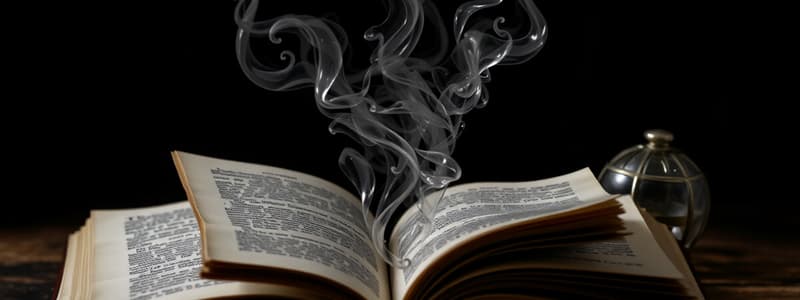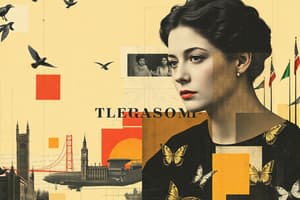Podcast
Questions and Answers
What is an allusion?
What is an allusion?
A brief and indirect reference to a person, place, thing or idea of historical, cultural, literary or political significance.
Which of the following is an example of an allusion?
Which of the following is an example of an allusion?
- It's raining cats and dogs.
- This place is like a Garden of Eden. (correct)
- He is a real Einstein.
- Don't act like a Romeo in front of her. (correct)
Who is typically referred to as the antagonist?
Who is typically referred to as the antagonist?
A character or group of characters that stand in opposition to the protagonist.
Which character is considered an antagonist in 'Antigone'?
Which character is considered an antagonist in 'Antigone'?
What does climax refer to in a narrative?
What does climax refer to in a narrative?
Flashcards
Allusion
Allusion
A brief, indirect reference to a significant person, place, idea, or event in history, culture, literature, or politics.
Antagonist
Antagonist
The character who opposes the protagonist; functions as the 'villain'. Can also create inner conflict.
Climax
Climax
The highest point of tension in a narrative; turning point where the rising action becomes falling action, leading to resolution.
Study Notes
Allusion
- An allusion is a brief, indirect reference to significant people, places, or ideas from history, culture, literature, or politics.
- It does not provide detailed descriptions; instead, it relies on readers’ existing knowledge.
- Understanding allusions enhances comprehension of themes and character motivations in a text.
Allusion Examples
- "Don't act like a Romeo in front of her." references Shakespeare's Romeo, symbolizing a passionate lover.
- "Unlocking Pandora's box" alludes to Greek mythology, suggesting that poverty could lead to serious consequences.
- "This place is like a Garden of Eden" references the biblical garden symbolizing paradise.
- "The new Newton of our school" implies a student with exceptional intelligence, referencing scientist Isaac Newton.
- Common references can also include ordinary people, as seen in the example about an ex-husband.
Antagonist
- The antagonist opposes the protagonist, often characterized as the "villain" in literature.
- Derived from the Greek word "antagonistēs," meaning opponent or rival.
- Antagonists can create inner conflicts within the protagonist, explored through themes of morality and personal struggle.
Antagonist Examples
- King Creon in "Antigone" obstructs the protagonist's efforts to honor her brother with a burial, highlighting their conflict.
- Iago in "Othello" schemes against Othello, manipulating situations to provoke jealousy without clear motives for his actions.
- In "Dr. Jekyll and Mr. Hyde," Hyde is the evil counterpart of Jekyll, illustrating the duality of human nature as Jekyll's inner antagonist.
- Bob Ewell in "To Kill a Mockingbird" embodies malignancy, targeting innocent characters and posing danger after the trial, showcasing deep-seated prejudice and malice.
Climax
- The climax represents the narrative's highest tension point, synonymous with the Greek term for "ladder."
- It marks the turning point in the story when the rising action shifts to falling action.
- The climax is crucial for resolving conflicts and driving the narrative toward its conclusion.
Studying That Suits You
Use AI to generate personalized quizzes and flashcards to suit your learning preferences.




